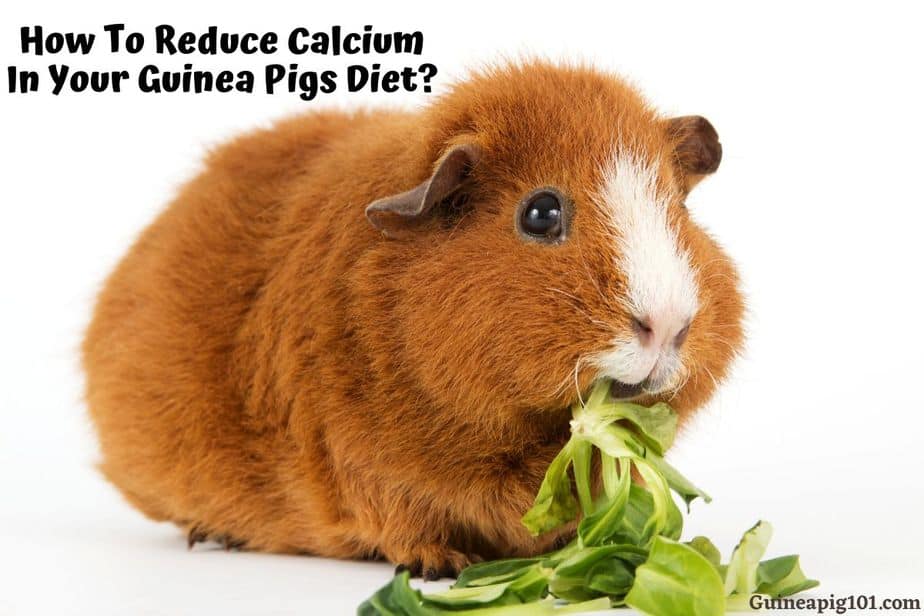Calcium is an essential nutrient required by everyone, and guinea pigs are no exception. Guinea pigs need calcium for the formation of bones, teeth, and other vital organs of the body.
However, most guinea pig owners end up feeding excess calcium to their guinea pigs, which increases the risk of health issues, including bladder stones and sludge. So today we shall discuss how you can reduce calcium in your guinea pig’s diet!
Guinea pigs with stone & sludge problems eat the same diet proportion, but with controlled portion sizes. Replacing the hay with good quality high fiber timothy hay, Low calcium vegetables, and providing enough hydration is the best way to reduce calcium intake of your guinea pigs.
The primary goal of reducing calcium in your guinea pig’s diet is not to eliminate it altogether.
It is meant to control the excess calcium that goes into their body and leaves via the urinary tract.
In the long run, the calcium starts getting deposited in the bladder resulting in the formation of bladder stones in guinea pigs.
Is calcium good for guinea pigs?
Yes, calcium is an essential mineral for our guinea pigs. It is crucial for the formation of healthy bones and teeth in your guinea pigs.
The deficiency of calcium in your guinea pig’s diet can result in Hypocalcemia. It is a condition when the calcium level in the blood of your guinea pigs goes below the minimum level.
Hypocalcemia can be extremely dangerous as your guinea pigs might pass away due to this condition without showing any signs of severe health issues.
Thus, make sure you don’t reduce calcium to an extreme level in your guinea pig’s diet.
Low calcium diet for guinea pigs
If your guinea pig is diagnosed with bladder stone or sludge, your vet will recommend serving a low calcium diet to your guinea pigs.
Now, what the vet means here is not to eliminate everything that has calcium in it from your guinea pig’s diet.
Instead, control the proportion & type of food being served to reduce the overall intake of calcium in your guinea pig.
Calcium is present in all kinds of food. Right from the hay, vegetables, plants, herbs, fruits, pellets, and even water, everything has some amount of calcium in it.
Thus, it is impossible to eliminate calcium altogether. We must aim to create a well-balanced low calcium diet for our guinea pigs.
However, to create a low calcium diet for our guinea pigs, we first need to understand how much calcium is required by our guinea pigs & how do guinea pigs absorb calcium from their food.
So, let’s first learn more about it.
How much calcium do guinea pigs need?
According to a study conducted by The National Academy of Science, average guinea pigs need 8 grams of calcium/Kg of their body weight.
This means if the weight of your guinea pig is one kg, then the will need 8 grams(8000mg) of calcium every day.
| Weight Of Your Guinea Pigs | Daily Calcium Requirement |
|---|---|
| 900 Grams | 7200mg (7.2 grams) |
| 1000 Grams | 8000mg (8 grams) |
| 1100 Grams | 8800mg (8.8 grams) |
| 1200 Grams | 9600mg (9.6 grams) |
You can use the above table as a reference and understand the calcium requirement of your guinea pigs as per their body weight.
Do remember that Young guinea pigs (age up to 16 weeks) need more calcium in their diet as their body grows at a rapid pace.
However, once your guinea pigs mature, they require less calcium in their diet.
If your guinea pigs have been diagnosed with bladder sludge or stones, then chances are, they are consuming more calcium than what is recommended for them.
You might need to monitor everything that goes into their diet to understand the calcium intake and regulate it accordingly.
Your vet may recommend the amount of calcium you need to serve to your guinea pigs.
Even if they don’t, you can use the above data as a baseline and serve the food accordingly to your guinea pigs.
How does a guinea pig absorb calcium?
Guinea pigs have an unusual way of absorbing calcium from food.
When a guinea pig eats any food, the food passes through the esophagus and reaches the intestines.
Here the pipes break the food into small particles absorbing the nutrients present in it.
In most mammals, the calcium and other vital nutrients absorption are managed by the parathyroid hormone (PTH).
However, in guinea pigs, it is not well-regulated.
According to a study, Guinea pigs absorb 50% more calcium from a food than what a regular human being does.
Thus, their body ends up absorbing most calcium from the food. As a result, the amount of calcium intake is directly proportional to the calcium present in their diet.
Effects of high calcium diet in guinea pigs?
When guinea pigs absorb more calcium than their body needs, the excess calcium is excreted in the form of urine from the urinary tract.
In the long run, the excess calcium gets deposited in the bladder, forming calculi.
In guinea pigs, solid calcification can be formed in bladder, urinary tract, etc. Thick calcium sludge can also get accumulated in the bladder that can lead to other urinary tract issues as well.
According to a study, It is quite reasonable to detect some mild calcium in your guinea pig’s urine once in a while.
However, in some guinea pigs, the extra calcium can bind together to form thick sludge or stones that can be difficult to pass out.
It might even require surgical removal in some cases, as it is harrowing for your guinea pigs.
Reducing calcium intake of your guinea pigs
Reducing calcium intake of your guinea pigs is really simple and straightforward.
You just need to monitor what goes into your guinea pig’s diet and at what quantity to create a healthy balance.
Chances are you are feeding excess calcium to your guinea pigs in some form.
Now what you need to do is reduce the amount of calcium by substituting some high calcium food items with a lower calcium substitute.
Also, there is one major factor to remember while looking at the calcium content of the food. i.e., Dry foods like hay & pellets have high concentrations of calcium as compared to fresh food like vegetables & fruits. Thus 5% calcium in hay is way more than 5% calcium in vegetables & fruits.
Hay and Fresh Grass

Hay is the staple portion of a guinea pig’s diet, and you need to keep it that way. 80% of your guinea pig’s diet should consist of hay as it helps in maintaining their digestive system, helps them in maintaining their teeth, etc.
While hay does contain some calcium content in it, you still want to keep it as a significant portion of your guinea pig’s diet.
| Types Of Hay/Grass | Calcium Content |
|---|---|
| Timothy Hay | 0.4-0.6% |
| Orchard Hay | 0.33% |
| Meadow Hay | 0.6% |
| Alfalfa Hay | 1.3% |
| Oats Hay | 0.4% |
| Fresh Grass | 0.35% |
| Water Cress | 4% |
As you can see the best hay for your guinea pigs shall either be timothy hay or orchard hay as it contains the least amount of calcium in it.
Avoid alfalfa hay at all cost as it contains over 1.3% of calcium in it.
One of the significant challenges in hay is most of the guinea pig owners end up buying bulk hay or cheap quality hay.
Now the quality of those hays is not bad, but what the company does is mix some alfalfa hay in those timothy and orchard hays to bring the cost of the product down.
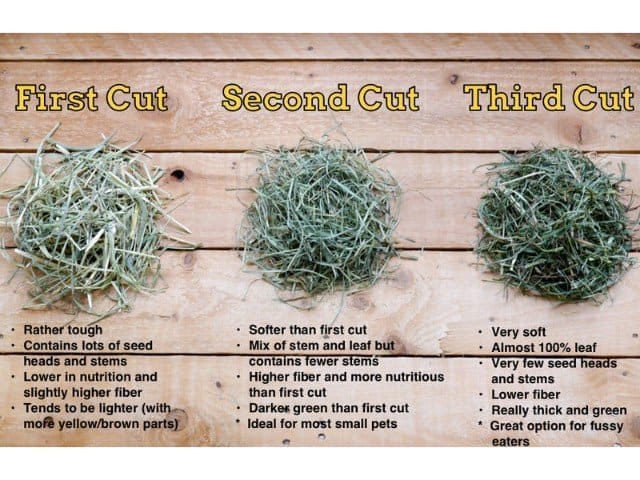
As a result, you end up feeding excess calcium to your guinea pigs.
So, if your guinea pig is suffering from problems of bladder stone or sludge, I would strongly recommend starting feeding good quality timothy hay or orchard hay only.
Fresh grass
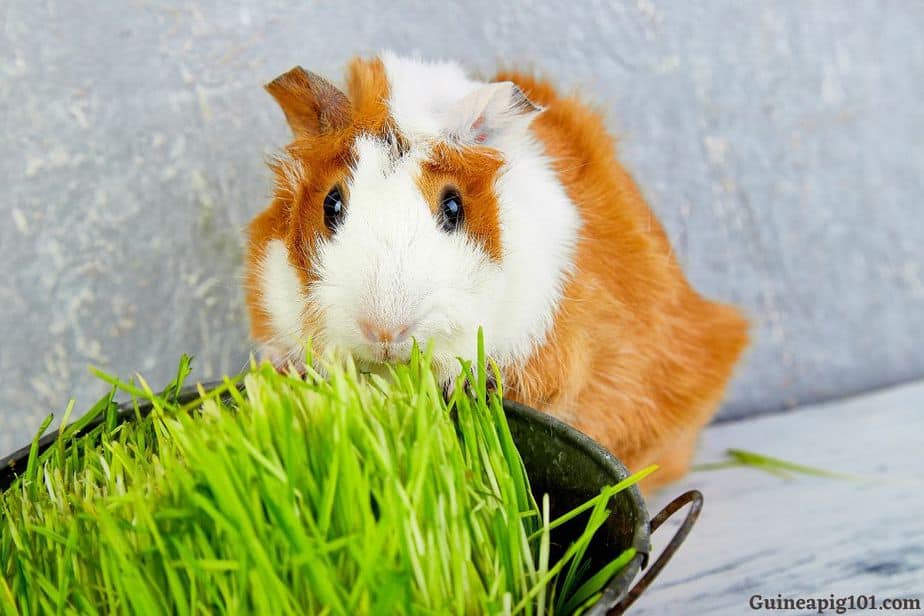
Alternatively, you can also start replacing a small portion of their hay with homegrown grass.
Please don’t throw in a bunch of fresh grass from your lawn, as it may contain some harmful chemicals that can harm your guinea pigs.
However, if you have time, you can grow in some fresh grass in containers and start replacing a small portion of your guinea pig’s diet with that fresh grass.
Fresh grass contains far less concentration of calcium due to high water content and is an excellent replacement for hay in such a scenario.
Pellets
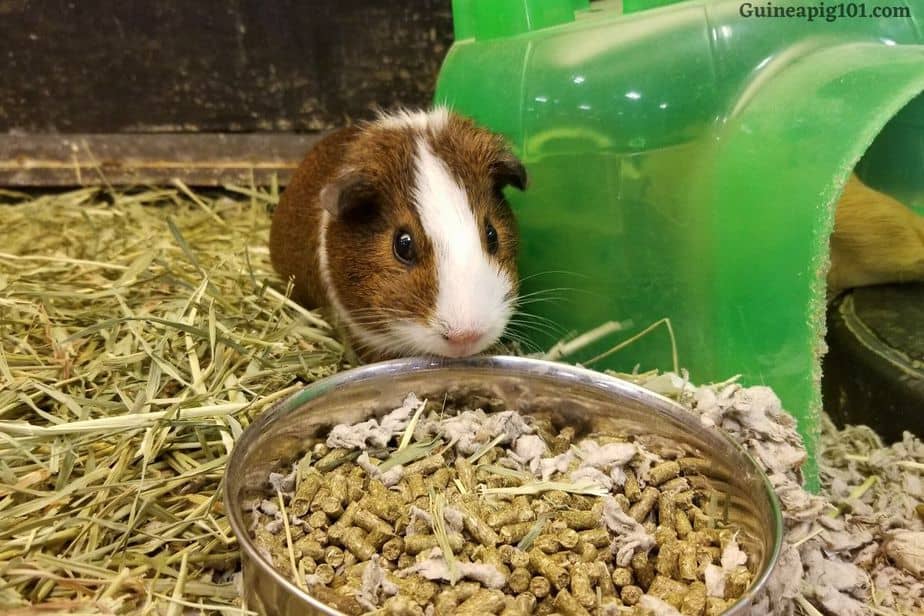
Pellets are another dry food that contains a decent amount of calcium in it. Controlling the amount of calcium in pellets is complicated, and there are only two ways you can achieve it:
- Reduce the consumption of pellets and replace them with some additional vegetables.
- Serve low calcium pellets to your guinea pigs.
Many new guinea pig owners often make a mistake of choosing the wrong type of pellet.
While selecting the pellet, you must look out for the calcium content in it and the base of the pellet as well.
Avoid pellets that have more than 0.6% calcium content in it. Also, make sure the pellet is timothy based and not alfalfa based.
You can also cut the pellets from their diet altogether.
However, make sure your guinea pigs eat a lot of vegetables rich in Vitamin C else your guinea pigs might suffer from another major health issue, also known as Scurvy.
Low calcium vegetables for guinea pigs
Vegetables are also an integral part of your guinea pig’s diet. A guinea pig needs a cup(125 grams) of fresh veggies daily.
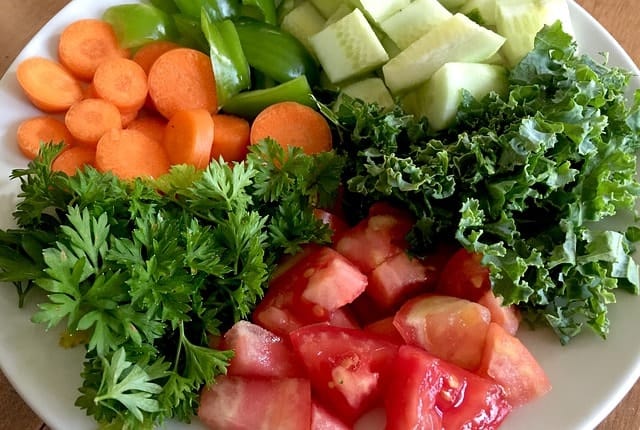
You can drastically reduce the calcium intake of your guinea pigs by substituting some vegetables in and out from their regular diet.
For example, the calcium content of carrot(100 grams) is 33 mg, whereas calcium content in kale (100 grams) is 254 mg.
However, the portion size matters too. A slice of carrot has more mass than a small leaf of Kale.
Vegetables contain a decent amount of water in it. Thus, the concentration of calcium in the vegetable is quite less as compared to pellets.
For example, 25grams of pellets contains approximately 200mg of calcium in it. While 25 grams of kale only contains around 65 grams of calcium in it.
Here are some popular low calcium vegetables for your guinea pigs. We have also mentioned an approximate amount of calcium content per serving according to our guinea pig’s dietary needs.
| Vegetables | Approximate Calcium(25grams Serving) |
|---|---|
| Carrots | 8.25 |
| Tomatoes | 2.5 |
| Bell peppers | 2.5 |
| Red Leaf Lettuce | 8.25 |
| Green Leaf Lettuce | 9 |
| Cilantro | 16.75 |
| Cucumber | 3.5 |
| Zucchini | 5.25 |
| Cabbage | 10 |
| Celery | 10 |
| Broccoli | 11.75 |
Thus, fresh vegetables can be an excellent replacement for pellets in your guinea pig’s diet.
Adding some extra fresh vegetables won’t add much of excess calcium in your guinea pig’s diet while adding some extra pellets can make a ton of difference in the same.
Water consumption
Water consumption has a direct impact on bladder stone or sludge issues. There are mainly two ways of how water consumption can affect it:
- Different types of water contain different levels of calcium in it.
- Adequate water consumption can dilute the urine thus it also dilutes sludge buildup in the bladder.
Calcium content in water
Drinking water has a varying amount of calcium in it depending upon the type of water and the area you live in.
Hard water has eight times more calcium than soft water.
While soft water usually contains 15mg calcium/liter, hard water contains over 120mg calcium/liter.
Thus, make sure you serve only soft water to your guinea pigs. If soft water is unavailable in your area, you can also get some bottled water for your guinea pigs.
You can also increase the water intake by serving more fresh food and decreasing the quantities of pellets from your guinea pig’s diet.
Fresh pasture grass is also an excellent replacement for hay that can help increase the water intake of your guinea pigs.
How can drinking more water prevent bladder stone in guinea pigs
Increasing the amount of water intake of your guinea pig is an excellent method to dilute the urine and prevent the formation of thick sludge in your guinea pig’s bladder.
A guinea pig can drink anywhere between a 100-300ml of water every day.
The consumption of water is dependent upon the type of food, weather, living environment, kind of water available, etc.
Now there is nothing much you can do to increase the water consumption of your guinea pigs directly. However, there are a few tips you can follow to increase it by a little bit:
- Add more than one source of water in your guinea pigs enclosure.
- Provide more watery vegetables and fruits.
- Replace their dry food(pellets) with some extra green veggies.
- Refill fresh water in the bottles at least 2-3 times a day.
- Make sure the water you are serving is of room temperature.
- Avoid any additives like Vitamin C drops as guinea pigs can smell and taste it, and thus they will drink less water.
How do you prevent bladder stones in guinea pigs?
There are a variety of factors that can lead to the formation of bladder stones in guinea pigs. Here are few ninja tips you must remember to prevent bladder stones in your guinea pigs:
- Ensure your guinea pigs get the right type of hay as per their need and age. While young guinea pigs(up to 16 weeks age) needs alfalfa-based hay, mature guinea pigs need Timothy-based hay to meet their dietary requirement.
- Good quality timothy based pellets with less than 0.6% calcium content should only be fed to your guinea pigs.
- Include a mix of low calcium vegetables with high calcium vegetables to create a well-balanced diet for your guinea pigs. Never serve high calcium vegetables on consecutive days.
- Increasing the amount of Vitamin C in the diet of your guinea pigs also helps prevent diseases.
- Replace pellets with fresh veggies if your guinea pigs show any sign of sludge in the urine.
- You can also replace a small portion of hay(10-15%) with fresh green pasture. Green and fresh foods have a low concentration of calcium in it. However, make sure the grass is organic and free of chemicals.
- Encourage your guinea pigs to drink more water. Adequate water consumption can dilute the urine and prevent the formation of sludge in the bladder.
- Always make sure you serve soft water with low calcium content in it. Hard water contains eight times more calcium than soft water. Thus, avoid it altogether.
- It is also seen that potty training your guinea pigs often increases the frequency of urine, and thus, it reduces the chances of formation of sludge.
Sources: Diet Composition and Mineral Balance in Guinea Pigs, Bladder and Urinary Tract Stones in Guinea Pigs, Dietary calcium and phosphate restriction in guinea-pigs, Urinary Calculus in A Guinea Pig, UROLITHIASIS IN GUINEA PIGS.
